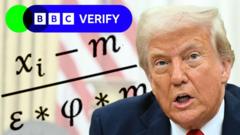In a significant shift, the European Union considers countermeasures against new U.S. tariffs, emphasizing the bloc's economic leverage.
European Union Weighs Economic Response to U.S. Tariffs

European Union Weighs Economic Response to U.S. Tariffs
E.U. leaders explore potential trade barriers following President Trump's tariff announcement.
April 3, 2025, 9:21 a.m. ET
In the wake of President Trump's recent imposition of tariffs, the European Union, the United States’ largest trading partner, is contemplating a strategic response bolstered by its economic clout. This move follows a wave of apprehension within the 27-nation bloc regarding the impact of the tariffs on their economies.
Ursula von der Leyen, president of the E.U. executive, expressed sentiments of betrayal from what she referred to as their "oldest ally." The European leaders, while initially preferring negotiation, are preparing for a more assertive stance should talks falter. Potential measures under consideration include increased tariffs targeting U.S. service firms, specifically major tech companies like Google that have substantial business operations in Europe.
Reports indicate that Europe is finalizing a list of elevated tariffs that may take effect as early as mid-April. E.U. officials highlighted that a vote among member state representatives could occur next week, with additional tariffs likely to follow as a response to both existing auto tariffs and Trump’s newly announced 20 percent levy on E.U. goods.
Von der Leyen remarked on the chaotic environment following the announcement of the tariffs, stressing the economic repercussions that could affect both sides of the Atlantic. Despite the escalating tensions, European leaders advocate for free trade and express a commitment to initiating dialogues through their trade commissioner, who is set to engage with U.S. counterparts shortly.
As the situation unfolds, the global economic landscape becomes increasingly intertwined, with both the U.S. and E.U. keenly aware that the repercussions of tariffs could extend beyond mere trade figures, influencing consumer prices and international relations.
In the wake of President Trump's recent imposition of tariffs, the European Union, the United States’ largest trading partner, is contemplating a strategic response bolstered by its economic clout. This move follows a wave of apprehension within the 27-nation bloc regarding the impact of the tariffs on their economies.
Ursula von der Leyen, president of the E.U. executive, expressed sentiments of betrayal from what she referred to as their "oldest ally." The European leaders, while initially preferring negotiation, are preparing for a more assertive stance should talks falter. Potential measures under consideration include increased tariffs targeting U.S. service firms, specifically major tech companies like Google that have substantial business operations in Europe.
Reports indicate that Europe is finalizing a list of elevated tariffs that may take effect as early as mid-April. E.U. officials highlighted that a vote among member state representatives could occur next week, with additional tariffs likely to follow as a response to both existing auto tariffs and Trump’s newly announced 20 percent levy on E.U. goods.
Von der Leyen remarked on the chaotic environment following the announcement of the tariffs, stressing the economic repercussions that could affect both sides of the Atlantic. Despite the escalating tensions, European leaders advocate for free trade and express a commitment to initiating dialogues through their trade commissioner, who is set to engage with U.S. counterparts shortly.
As the situation unfolds, the global economic landscape becomes increasingly intertwined, with both the U.S. and E.U. keenly aware that the repercussions of tariffs could extend beyond mere trade figures, influencing consumer prices and international relations.




















